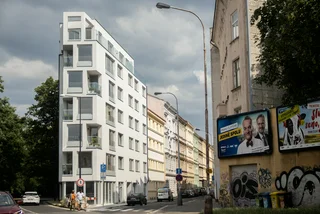As demand for small and energy-efficient housing is on the rise in Czechia, interest in other types of apartments is either stagnating or declining. This shift has led developers, especially in major cities, to introduce micro-apartments, as ČT24 reports. Some are as small as 10 square meters (sq m).
People increasingly seeking smaller apartments
In large cities like Prague, the demand for compact apartments is steadily increasing, even as their size continues to decrease. A notable example is a 9 sq m unit in Prosek, Prague, located inside a large residence building, which sold for almost CZK 2 million earlier this year.
Katarina Tochtarová, co-owner of the building, explained that the average area of the 46 accommodation units in the house ranges from 14 to 19 sq m. This downsizing trend reflects a broader shift in housing preferences, as the average size of new studio apartments has decreased from 27 to 22 sq m over the past two decades.
To address the spatial constraints of these compact apartments, developers are incorporating communal laundry and dryer facilities within the buildings. In the past five years, prospective buyers have divided into two main groups: one seeking smaller living spaces and the other looking for larger, more energy-efficient properties. The latter category has seen success, exemplified by the rapid sale of all 48 units in Hradec Králové's first passive house.
A broad rise in prices
Furthermore, a growing divergence in property prices has become apparent in the real estate market. While older, unrenovated properties or those in undesirable locations are experiencing declining prices, energy-efficient apartments are witnessing rapid appreciation. František Brož, a spokesperson for real estate firm Bezrealitky, noted that this trend is expected to intensify,
The rental market in the Czech Republic is also witnessing changes, with rental prices rising by almost 1.5 percent in the second quarter. This increase is most pronounced in Liberec, where rents surged by 3.5 percent. In contrast, Zlín experienced a decrease of less than three and a half percent. Prague continues to have the highest rental rates, while Ústí nad Labem offers the most affordable rental options.
In some locations, the demand for rental properties significantly outstrips supply, driven by high mortgage interest rates and increased demand from students and long-term foreign workers. Analysts do not anticipate a significant decrease in rental prices in the near future.
While there has been a slight increase in completed apartments in the first seven months of the year, the number of new construction starts is declining, primarily due to rising costs and a shortage of building plots in major cities like Prague, where construction is even extending to flood-prone areas. These factors collectively reflect the dynamic changes in the Czech real estate market and a growing emphasis on compact and energy-efficient living spaces.












 Reading time: 2 minutes
Reading time: 2 minutes 

























